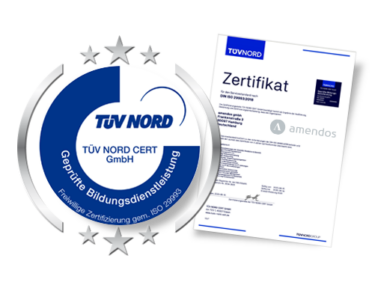IT Vendor Management Fundamentals
Course overview
Many IT outsourcing projects fail in achieving the desired goals, e.g. reducing IT costs or increasing flexibility. In addition to unclear contractual agreements, the main reason for this is that companies are underestimating the required vendor management during operations: Only a few companies monitor and control their external IT service providers efficiently. Within the seminar IT Vendor Management Fundamentals all aspects and prerequisites will be presented which are needed to set up an efficient vendor management and a successful cooperation with service providers. Many exercises give participants an idea of how the fundamentals can be implemented in their own environment. This gives participants a base for their daily work in vendor management, but also for identifying gaps and weaknesses in their own company.
Your Benefits of the seminar IT Vendor Management Fundamentals
… you will get
- an overview of all relevant tasks,
- insights into options of organizational integration,
- tips for an efficient vendor management, especially in multi-provider environments,
… you will learn
- the IT vendor management fundamentals, especially
- which 9 dimensions have to be taken into account when building up an efficient vendor management,
- which basic conditions, methods and organization are necessary for a successful cooperation,
- how to design them efficiently, how to avoid friction losses and how to achieve your goals.
Who should attend
- IT Managers, Service Managers, IT Operations Managers, IT Service Providers
- Employees involved in IT vendor management and IT outsourcing projects
Course details – IT Vendor Management Fundamentals
- Introduction
(Definitions, alignment,vendor management & the outsourcing life cycle) - Basic conditions
(Customer and service orientation, standardization, sourcing strategy/goals, pro-vider categorisation, outsourcing contract, successful service transition) - Integration into the organizational structure
(Task overview, role/responsibility assignment, various options for organizational integration, interfaces to other teams) - Required personnel & skills
(e.g. qualifications, competencies, risks & success factors) - Relevant processes
(Processes & interfaces to be considered, process design & implementation) - Tools
(Necessary tools & interfaces for service operations and provider control, RPA) - Governance
(Evaluation of providers, review of the sourcing strategy, relationship management / committees/meetings. risk, knowledge and compliance management) - Operations
(Reporting & performance management, operations management: service integration & monitoring, finance management: managing invoices & budgets) - Changes
(Handling of changes, claim management, integration of change projects into internal project portfolio management, changing the provider) - Continual Improvement
(Improvement process, innovation management, SPICE for vendor management)
There is plenty of room for exercises, discussions and exchange of experiences.


